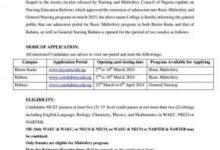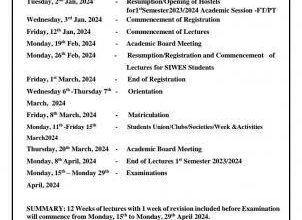
WAEC Syllabus for Graphic Design
WAEC Syllabus for Graphic Design. WAEC Syllabus for Graphic Design is available for all candidates who want to participate in the examination. The West African examination council (WAEC) has officially introduced a syllabus that will guide all the WAEC candidates who wish to write the WAEC examination this year. For a very successful WAEC Graphic Design examination for this year, you need to check out the available areas of concentration. It has been divided into sections with chapters, followed by the topics to be covered in preparation for the exams. In the WAEC Syllabus for Graphic Design, you will also see the format of how the WAEC Graphic Design questions will be presented. Jamb form
There are 3 sections to answer questions from. Paper 1 is Objective and paper 2 contains essay questions and then paper 3 is the practical section. Where paper one (1) carries 50 minutes for 40 marks; paper two (2) carries 2 hours for 60 marks while paper 3 carries 80 marks
👉 Relocate to Canada Today!
Live, Study and Work in Canada. No Payment is Required! Hurry Now click here to Apply >> Immigrate to Canada
This WAEC syllabus is for both the O’level WAEC and General Certificate Examination (GCE) candidates. Final year students in the senior secondary school level and external candidates are eligible to make use of this syllabus and prepare ahead of the examination. WAEC Syllabus for Graphic Design
See the full detailed information concerning the WAEC Graphic Design Syllabus below.
PREAMBLE
This syllabus is designed to provide theoretical and practical skills in Graphic Design as a vocation. It is also designed to provide adequate foundation for students who would pursue further education in tertiary institutions and also to enable them acquire skills for self-employment.
AIMS AND OBJECTIVES
The examination seeks to test the candidates’ perceptual, analytical and manipulative skills in Graphic Design.
It also seeks to assess the candidates’ capabilities in the following: Waec Result
(1) manipulation and maintenance of tools,
(2) uses of materials,
👉 Relocate to Canada Today!
Live, Study and Work in Canada. No Payment is Required! Hurry Now click here to Apply >> Immigrate to Canada(3) planning and production processes.
SCHEME OF EXAMINATION
There will be three papers, Paper 1, 2 and 3 all of which must be taken. Papers 1 and 2 will be a composite paper to be taken at one sitting.
PAPER 1: Will consist of forty multiple-choice objective questions all of which must be answered within 50 minutes for 40 marks.
PAPER 2: Will consist of six essay-type questions. Candidates will be required to answer four questions within 2 hours for 60 marks.
PAPER 3: Will be two practical projects out of which candidates will execute one within five days, working for six hours each of the days. The paper will carry 80 marks.
The question paper will be sent to the candidates two weeks before the execution period for candidates to study. Designing of sketches and preparatory notes should also be done within the two weeks prior to the execution of the project. These will carry 20 marks. The total mark for the paper is therefore
DETAILED SYLLABUS
The course in Graphic Design includes the study of the perceptual, analytical, manipulation and the uses of materials. For the examination, candidates will be expected to have covered all aspects of the teaching syllabus both in theory and practical based on the following:
- Importance of Graphic Design
The importance of Graphic Design as a profession.
The role of graphic design in the society.
- Graphic Design tools, materials and equipment
- Lettering
The historical development of the alphabet, Basic forms: Block lettering, serif, calligraphy, freestyle lettering.
Principles and practice of lettering.
- Drawing And Illustration
Basic drawing: forms and shapes. Npower Recruitment
Composition and proportion.
Perspective drawing.
Shading techniques: hatching and crosshatching, (smudging) blending, Stippling (pointillism)
Illustration techniques: pen and ink, pen and wash, flat colour, realistic painting, silhouette, photography, abstract painting, engraving.
Importance of illustration, cartooning; the types, importance and functions.
- Colour
Colour relationships: i.e tints and shades, colour harmonies, analogous and complementary, cool and warm colours, primary and secondary colours, tertiary colour etc.
Colour symbolism:
- Communication Design
Visual communication.
Meaning and Importance.
Design process: stages and layout
Types of communication design media: eg. poster, banner, package, label,
signboard, signpost, book cover, billboard, handbill
- Reproduction Processes In Graphic Design
Historical development, tools, materials and equipment, processes.
Processes ie relief printing, stencil printing.
Other printing processes – lithography, gravure, photography.
Electronic printing devices: Ink jet printing, laser, electrostatic printing.
- Book Design
Book typography, type styles and their uses, type indication methods and Page layout.
- Paper Craft
The development of paper, types of paper and their uses, paper sizes, method of making decorative paper: marbling, comb pattern, doodling, wax resist, roller and twine pattern. Waec Result
- Book Binding
Parts of a book, tools, materials, equipment and their uses.
Binding methods and styles, book repair binding process, care and maintenance of books.
- Computer For Graphic Design
Uses of appropriate computer software to design visual communication items.
- Entrepreneurial Skills In Graphic Design
Graphic Design careers: Illustration, cartooning
publishing.Graphic Design employment avenues: Advertising houses, Printing houses, Ministries, Self-employment.
Setting up graphic design enterprise, factors to consider: pricing, costing and marketing.
Building a portfolio of works.
- Exhibition
Importance of exhibition. Naira to Pounds
Types of exhibition
Factors to consider when exhibiting
Organizing and Mounting exhibition.
Check and Confirm: How much is Dollar to Naira Today Pounds To Naira Rate Today






